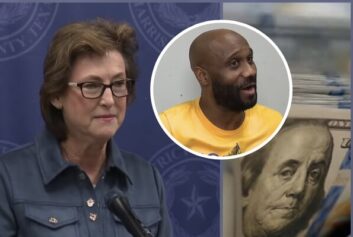Essence magazine named her as one its 35 Under 35, Black & Amazing.
NYC’s celebrity row took to Twitter to congratulate Brooklyn’s newest phenom:
Famed filmmaker Spike Lee tweeted: “Shout Out To 17 Year Old Lia Neal, Sista From Fort Greene, Brooklyn Who Made USA Olympic Swimming Team. Kick Bukoo Ass in London. BK ALL DAY YO.”
Grammy-Award winning singer Alicia Keys, wrote a message of inspiration: “I always wanted to be an Olympic swimmer!! Congratulations to @lianeal Amazzing!!!! J .”
And popular anchorwoman and talk show host Katie Couric stated: “Only 17 & 2nd African-American female swimmer to rep us on the @USOlympic team?? Go, Lia!!”
And so it begins.
“I feel like I always wanted to make the Olympics, like so many other kids,” says Lia Neal. “But it always seemed like a dream and never really seemed like something that was possible, until recently.”
The march toward cultural relevance and even (gasp) hints of immortality often start quietly and by anonymous people. Lia Neal isn’t a household name by any stretch of the imagination and regardless of what happens in London she still won’t be, but if she does well she’ll have the chance to be remembered in history books and sports documentaries. It’s hard not to be when you’re on such a select list.
According to USA Swimming, 70 percent of African-Americans children between the ages of six and 16 are non-swimmers. As a result, black children, ages five to 14, are almost three times more likely to drown than Caucasian kids in the same age range. Black boys, who drown at twice the rate of African-American girls, are most at risk. “Black folks don’t swim” or so goes the story. So Neal’s accomplishment of making Team USA’s Women’s Relay squad is certainly noteworthy, amazing even. You don’t even have to follow swimming to understand that fact.
The legacy of black swimmers in this country has not only been enriched by Neal’s achievement but elevated by the African-American swimmers who have come before her. How many have come before her you ask? Well as far as female Olympic swimmers go that number is one. Yes, one.
Neal’s inspiration to make the London games came from her predecessor, Maritza Correia, the first female swimmer of African-American descent to make the U.S. Olympic swim team. Correia, 30, won a silver medal in the 400 freestyle relay at the 2004 Games in Athens, only to later be forced to hang up her swim cap after she tore the labrum in her shoulders. She retired just before the 2008 Olympic Trials.
Meanwhile, in 2008, Neal and fellow Olympian Missy Franklin were the youngest swimmers at the Olympic Trials in Omaha. Neal, who has three older brothers, qualified a month before turning 13 by breaking an 11-12 age-group record in the 100-meter freestyle with a time of 58.17. At the trials, she finished 78th in the 100 free and 28th in the 50-meter freestyle, failing to make the team. But even that brush with the Olympics was noteworthy.
The youngest of four, Neal was raised in the Fort Greene section of Brooklyn by her parents, Jerome and Siu Neal, who are of African-American and Chinese descent, respectively. The trilingual Olympian –she’s fluent in English, Cantonese and Mandarin– started taking swim lessons at age six and began training at AGUA (Asphalt Green Unified Aquatics), a competitive swim team on Manhattan’s tony Upper East Side, at age eight, when she received a scholarship offer.
Swimming, like golf and tennis, has always been considered a “country club” sport. Even though, contextually it’s different and doesn’t fall under the exclusivity banner as other sports that often requires equipment and membership dues. We’re not talking archery and polo here – sports where the barriers of admission are just too robust, too exotic. Swimming is nearly ubiquitous. Everyone has been inside of a pool regardless of whether they are great swimmers or know how to swim, at all.
Summertime pools prove that fact every time the temperature rises above 90 degrees. People take family trips to water parks and have parties at local beaches. Water doesn’t surprise anyone; there are no questions to ask. There’s a built in level of familiarity and the access for Black folk is wide open and has been for the last 30 years. Stories of “Whites Only” pools only exist in the communal sub-conscious, but few of us, under the age of 40, have ever experienced that outright. Even though it’s general knowledge that Blacks, on average, don’t swim as often as other racial groups (for a variety of theorized reasons), that still doesn’t explain why, in 2012, on an Olympic scale, the numbers are so slight.
Neal joins Cullen Jones and veteran swimmer Anthony Ervin as the third African-American member on the U.S. Olympic swim team to stamp her ticket to London. Jones, 28, is the American record holder in the 50 free (21.40) and an Olympic Gold medalist from the 2008 games in Beijing. Ervin, 31, was the first American swimmer of African descent in history to earn a berth on the U.S. team. He shared Gold during the Sydney Games in 2000 and later retired in ‘03. After a nine-year hiatus from the sport, Ervin secured his spot on the ’12 team by finishing second in qualifies. Together, the trio is set to make waves in London, while representing the rising diversity in the sport.
“We went from, ‘who’s going to make it?’; to, ‘who is going to be first?’; to having Anthony in 2000, then me in 2004 and Cullen in ’08,” explains Correia. “For us to go from 2000 to 12 years later and have three African-Americans on one Olympic team…it’s just one of those things where we can say all of this hard work has really paid off.”
As it stands, Neal is part of an elite club of African-Americans who have swam against the current of “blacks-can’t-swim” stereotype and achieved success in a predominately white sport.
“I’m very proud of that,” Jones confirms. “I definitely think it’s something we will all look back on after London games and kind of marvel at. I think we’re all kind of focused on London and wanting to be the best at this stage.
I’ve been watching Lia’s progression from day one,” he continues. “Although, she’s 17, she’s ready for the pressure. She’s ready for the Olympic games and everything that comes with representing your country. It’s a testament to her maturity.”
Yet despite the success of trailblazers like Ervin, Correia and Jones, swimming to date has not produced iconic figures like Tiger Woods or Serena and Venus Williams. There hasn’t been this brand name person to point to as a torch-bearer. Some of that is due to the fact that Olympic sports don’t have a shelf-life beyond the two weeks of the games. Also, Americans follow team sports mostly. Individual sports are limited to golf, boxing and increasingly mixed martial arts. The other reasons are more complicated, but these aren’t Neal’s concerns. At least not right now. Neal is too busy
Now, after four years of sheer determination, discipline – starting her days at 5 a.m., practice commutes to Manhattan – Neal’s dreams of competing on the highest-stage of her sport have finally come to fruition.
The racer turned on her jets a month before the London games trials. Although Neal is considered one of the nation’s fastest 200-meter Women’s freestyle swimmers (ranked fifth), in the 100-meter free (in which she’s ranked sixth) her name was rarely mentioned amongst the division’s top competitors.
In comparison to America’s sweethearts – Colorado phenom Missy Franklin, four-time NCAA national champion Allison Schmitt, American record holder Amanda Weir and 11-time Olympic medalist Natalie Coughlin – Neal was considered a long shot at making the games.
Then, on May 13, at the 2012 Ultra Swim in Charlotte, North Carolina, in the Women’s 100-meter freestyle finals, with all eyes were on the veterans Coughlin and Jessica Hardy, the upstart settled into her pre-heat ritual of zoning out to Lil’ Wayne’s lively hit “6’, 7”. The result? Neal emerged from the water victorious, beating Hardy by .01 seconds, touching the wall at 54.35 seconds. Coughlin finished third.
Neal’s evolution has been one to watch. She will compete in the freestyle relay on Saturday July 28, just a day after the Olympic opening ceremony. Whether she reaches the podium or not, the young sprinter already has forged a developing legacy as one of the first to break the racial color barrier in swimming.
After the Olympics, especially if she does well, hopefully she can be that role model that the sport seems to need. She has already started moved towards that with the program Swim Brooklyn, an integrated initiative with the USA Swimming Foundation that works to encourage inner city youth about water safety. From here on out hopefully she can do a few promos, go into classrooms and start a national campaign on a subject that even in 2012 needs far more of a lasered focus. With a shiny medal around her neck she’d be welcomed with open arms.



